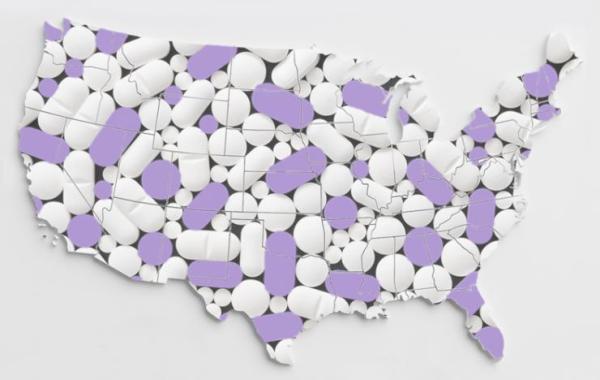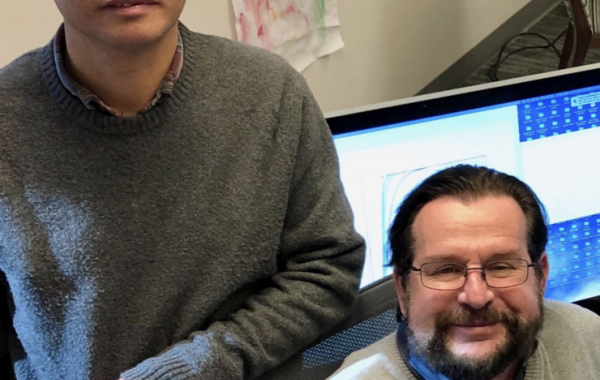ASPIRE-ing to Find Fast Solutions to the Opioid Health Crisis

Researchers are already hard at work trying to find fast scientific solutions to the national opioid public health crisis, which the Department of Health and Human Services says was responsible for two out of three drug overdose deaths in 2018.
Two School of Biological Sciences researchers have joined the effort to find answers to the crisis. Jeffrey Skolnick, Regents’ Professor, Mary and Maisie Gibson Chair, and GRA Eminent Scholar in Computational Systems Biology; and Hongyi Zhou, Senior Research Scientist in the school, are on a team that recently captured top honors in a recent National Institutes of Health-sponsored competition to find novel, outside-the-box approaches to the opioid problem.
Their plan, “Development of a Comprehensive Integrated Platform for Translational Innovation in Pain, Opioid Abuse Disorder and Overdose” — which will use artificial intelligence, data and molecular analysis, cloud computing, and predictive algorithms in the search for new drugs — was one of five winning applications in a November 2020 competition. The results were announced April 26.
Skolnick and Zhou have now won two stages of the National Center for Advancing Translational Sciences (NCATS) ASPIRE Challenge, part of the NIH’s HEAL (Helping to End Addiction Long-Term) program. (ASPIRE stands for A Specialized Platform for Innovative Research Exploration.)
Skolnick’s group includes Andre Ghetti with ANABIOS Corporation, and Nicole Jung with Karlsruhe Institute of Technology in Germany.
“We’re extremely grateful,” Skolnick says. “We’re very excited about this. The problem of opioid addiction and chronic pain is a real plague in America and for most of the world, and there aren’t a lot of real, good answers, so this is motivating us to get people to think of novel solutions. We really appreciate the chance to put this team together.”
Rapidly translating scientific advances into immediate help for patients
NCATS defines translational science as “the process of turning observations in the laboratory, clinic, and community, into interventions that improve the health of individuals and the public — from diagnostics and therapeutics, to medical procedures and behavioral changes.”
The 2018 NCATS ASPIRE Challenge involved design competition in four component areas: integrated chemistry database, electronic synthetic chemistry portal; predictive algorithms, and biological assays (strength/potency tests.) Skolnick and Zhou were also part of a winning team in that stage.
Skolnick calls his group’s predictive algorithms “our unfair competitive advantage” — data programs that can predict in advance the probability of a drug’s success. “In principle you could screen every molecule under the sun if you had infinite resources. You could test everything, but that’s very expensive and time-consuming. We can go through this list and prioritize them and say, this one has an 80 percent probability it will work.”
Skolnick’s group added Ghetti and June for the 2020 ASPIRE Reduction-to-Practice Challenge. “The goal of this Challenge is to combine the best solutions and develop a working platform that integrates the four component areas. The Reduction-to-Practice Challenge consists of three stages: planning; prototype development and milestone delivery; and prototype delivery, independent validation, and testing,” notes the NCATS website.
Skolnick says his team’s application is designed to be accessed digitally as part of a cloud service. It will use artificial intelligence and machine learning to investigate molecules that could be turned into new drugs, as well as explore undiscovered uses for existing drugs.
“Andre’s company is going to do the testing of the molecules, and Nicole Jung will organize all the data and store it so we can have a platform that is used not just by us, but by the (scientific) community,” Skolnick explains. “We’re looking for novel mechanisms for drugs that relieve pain and treat addiction. The goal is to do this at high throughput, rather than one at a time. This is really designed to test the ideas at scale. You can get it to people a lot quicker.”
Skolnick hopes to have a robust working platform built within a year. Given the extent of the opioid crisis in the U.S. alone, the faster new non-addictive pain management drugs can be found and tested, the better, he adds.
“The need is critical. It’s one of these horrible societal problems that really require novel solutions, which means you want to understand all the mechanisms of pain, but do we understand the gears you want to turn to alleviate it?”

